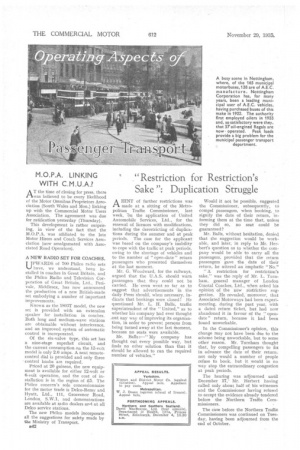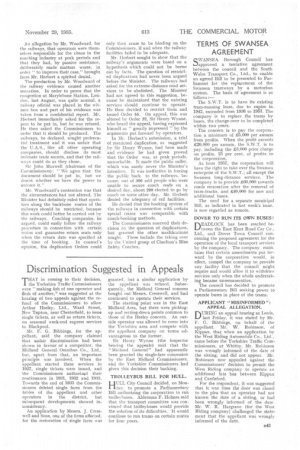"Restriction for Restriction's Sake ": Duplication Struggle
Page 56

Page 57

If you've noticed an error in this article please click here to report it so we can fix it.
AHINT of further restrictions was made at a sitting of the Metropolitan Traffic Commissioner, last week, "bn the application of United Automobile Services, Ltd., for the renewal of licences with modifications, including the derestricting of duplications during the summer and at peak periods. The case for the applicant was based on the company's inability to cope with the traffic at peak periods, owing to the shortage of vehicles and to the number of " open-date " return passengers who presented themselves at the last moment.
Mr. G. Woodward, for the railways, argued that the U.A.S. should warn passengers that they could not be carried. He even went so far as to suggest that advertisements in the daily Press should, when necessary, indicate that bookings were closed ! He questioned Mr. L. H. Balls, traffic superintendent of the "United," as to whether his company had ever thought out any way of improving its organization, in order to prevent persons from being turned away at the last moment, because no seats were available.
Mr. Balls :—" My company has thought out every possible way, but finds no other solution than that it should be allowed to run the required number of vehicles." Would it not be possible, suggested the Commissioner, subsequently, to compel passengers, when booking, to signify the date of their return, informing them at the time that, unless they did so, no seat could be guaranteed?
Mr. Balls, without hesitation, denied that the suggestion would be workable, and later, in reply to Mr. Herbert's question as to whether the company would be able to carry all the passengers, provided that the return passengers gave the date of their return, he uttered an emphatic "No."
A restriction for restriction's sake," was the reply of Mr. L. Turnham, general manager of London Coastal Coaches, Ltd., when asked his opinion of the rfew restrictive suggestion. He revealed, moreover, that Associated Motorways had been experimenting, during the past year, with a dated return ticket, but had now abandoned it in favour of the " opendate" return, because it had been found unworkable.
In the Commissioner's opinion, this change may not have been due to the scheme being unworkable, but to some other reason. Mr. Turnham thought that, by compelling passengers to fix in advance the date of their return, not only would a number of people refuse to book, but it would in no way stop the extraordinary congestion at peak periods.
The hearing was adjourned until December 17, ' Mr. Herbert having called only about half of his witnesses and the Commissioner having refused to accept the evidence already tendered before the Northern Traffic Commissioners.
The case before the Northern Traffic Commissioners was continued on Tuesday, having been adjourned from the end of October. An allegation by Mr. Woodward, for the railways, that operators were themselves responsible for the chaos in the coaching industry at peak periods and that they had, by passive resistance, deliberately made matters worse, in order " to improve their case," brought from Mr. Herbert a spirited denial.
The production by Mr. Woodward of the railway evidence caused another sensation. In order to prove that the congestion at Maryleborie Station, London, last August, was quite normal, a railway official was placed in the witness box and part of his evidence was taken from a confidential report. Mr. Herbert immediately asked for the report to be put in, but he was refused. He then asked the Commissioners to order that it should be produced. The railways, he declared, sought preferential treatment and' it was unfair that the U.A.S., like all other operating companies, should disclose its most intimate trade secrets, and that the railways could do as they chose.
Sir John Maxwell (chairman of the Commissioners): "We agree that the document should be put in, but we doubt whether we have the power to enforce it."
Mr. Wood ward's contention was that the circumstances had not altered. The Minister had definitely ruled that operators along the backbone routes of the railways should be restricted, because this work could better he carried out by the railways. Coaching -companies, he argued, could easily follow the railway procedure in connection with certain trains and guarantee return seats only when the return date was specified at the time of booking. In counsel's opinion, the duplication Orders could
only then cease to be binding on the Commissioners, if and when the railway .facilities failed to be adequate.
Mr. Herbert sought to show that the railway's arguments were based on a hypothesis which could not be borne out by facts. The question of restricted duplications had never been argued before the Minister. The railways had asked for the extreme-distance road services to be abolished: The Minister had not agreed to this suggestion, because he maintained that the existing services should continue to operate. He then decided to restrict them and issued Order 55. On appeal, this was altered by Order 32, Sir Henry Wynne, who heard the appeal, having expressed himself as "greatly impressed" by the arguments put forward by operators.
In Mr. Herbert's submission, a trial of restricted duplication, as suggested by Sir Henry Wynne, had been made and evidence he had given proved that the Order was, at peak periods, unWorkable. It made the public suffer, which was surely never the Minister's intention. It was ineffective in forcing the public back to the railways, because, out of 300 odd people who were unable to secure coach seats on a desired day, about 200 elected to go by coach on some other day. Mr. Herbert denied the adequacy of rail facilities.
He denied that the booking system of the railways in connection with certain special trains was comparable with coach-booking methods.
The Commissioners reserved their decision on the question of duplications, but granted the other modifications sought. These include the taking over by the United group of Charlton's Blue Safety Coaches.




























































































